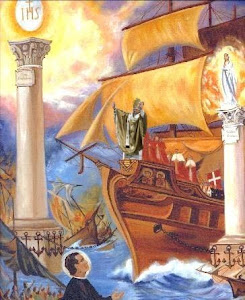 Entrevista com o Card. Castrillon Hoyos
Entrevista com o Card. Castrillon HoyosCardinal Dario Castrillon Hoyos: I think it's a good one. There are some probems because it’s a new way of celebrating liturgy and they need time to prepare priests and catechists on the content of the Extraordinary Form.
CC: To be informed. Many of the difficulties come out because they don’t know the reality of the Gregorian Rite – this is the just [correct] name for the Extraordinary Form, because this Mass was never prevented, never. Today for many bishops it is difficult because they don’t have priests who don’t know Latin. Many seminaries give very few hours to Latin – not enough to give the necessary preparation to celebrate in a good way the Extraordinary Form. Others think that the Holy Father is going against the Second Vatican Council. That is absolute ignorance. The Fathers of the Council, never celebrated a Mass other than the Gregorian one. It [the Novus Ordo] came after the Council … The Holy Father, who is a theologian and who was in the preparation for the Council, is acting exactly in the way of the Council, offering with freedom the different kinds of celebration. This celebration, the Gregorian one, was the celebration of the Church during more than a thousand years … Others say one cannot celebrate with the back to the people. This is ridiculous. The Son of God has sacrificed himself to the Father, with his face to the Father. It is not against the people. It is for the people …
CC: Yes, of course. We cannot celebrate this without knowledge of the language, of the signs, of the ways of the Rite, and some institutions of the Church are helping in that way.
CC: All the parishes. Not many – all the parishes, because this is a gift of God. He offers these riches, and it is very important for new generations to know the past of the Church. This kind of worship is so noble, so beautiful – the deepest theologians’ way to express our faith. The worship, the music, the architecture, the painting, makes a whole that is a treasure. The Holy Father is willing to offer to all the people this possibility, not only for the few groups who demand it but so that everybody knows this way of celebrating the Eucharist in the Catholic Church.
CC: I would like it, and it will be necessary. We are writing to the seminaries, we are in accord that we have to make deep preparation not only for the Rite, but for [teaching] the theology, the philosophy, the Latin language …
CC: What is progress? "Progredire", means [offering] the best to God… I am surprised, because many young people are enthusiastic with the celebration of the Gregorian Rite …
CC: Not "exceptional". Extraordinary means "not ordinary", not "exceptional."
CC: It is not going back: it is taking a treasure which is present, but was not provided. … But it takes time. The application of the reforms of the Second Vatican Council took years. It takes time to understand the deep profundity of the old Rite. The Holy Father is not returning to the past; he is taking a treasure from the past to offer it alongside the rich celebration of the new Rite. The second Eucharistic prayer of the new Rite is actually the oldest one [in the Church’s entire liturgy]. It’s not a matter of confrontation but of fraternal dialogue.
CC: Not exactly a clarification of the Motu Proprio, but of matters treated in the Motu Proprio, such as the calendario, ordinations to the sub-diaconate, the way of using vestments, the Eucharistic fast.
CC: It's a matter of common sense … In every bishop's household there are maybe three or four persons. This is a stable group … It is not possible to give two persons a Mass, but two here, two there, two elsewhere – they can have it. They are a stable group.
CC: No problem! This is our world. Managers of enterprises don’t live in one place, but they are a stable group.




